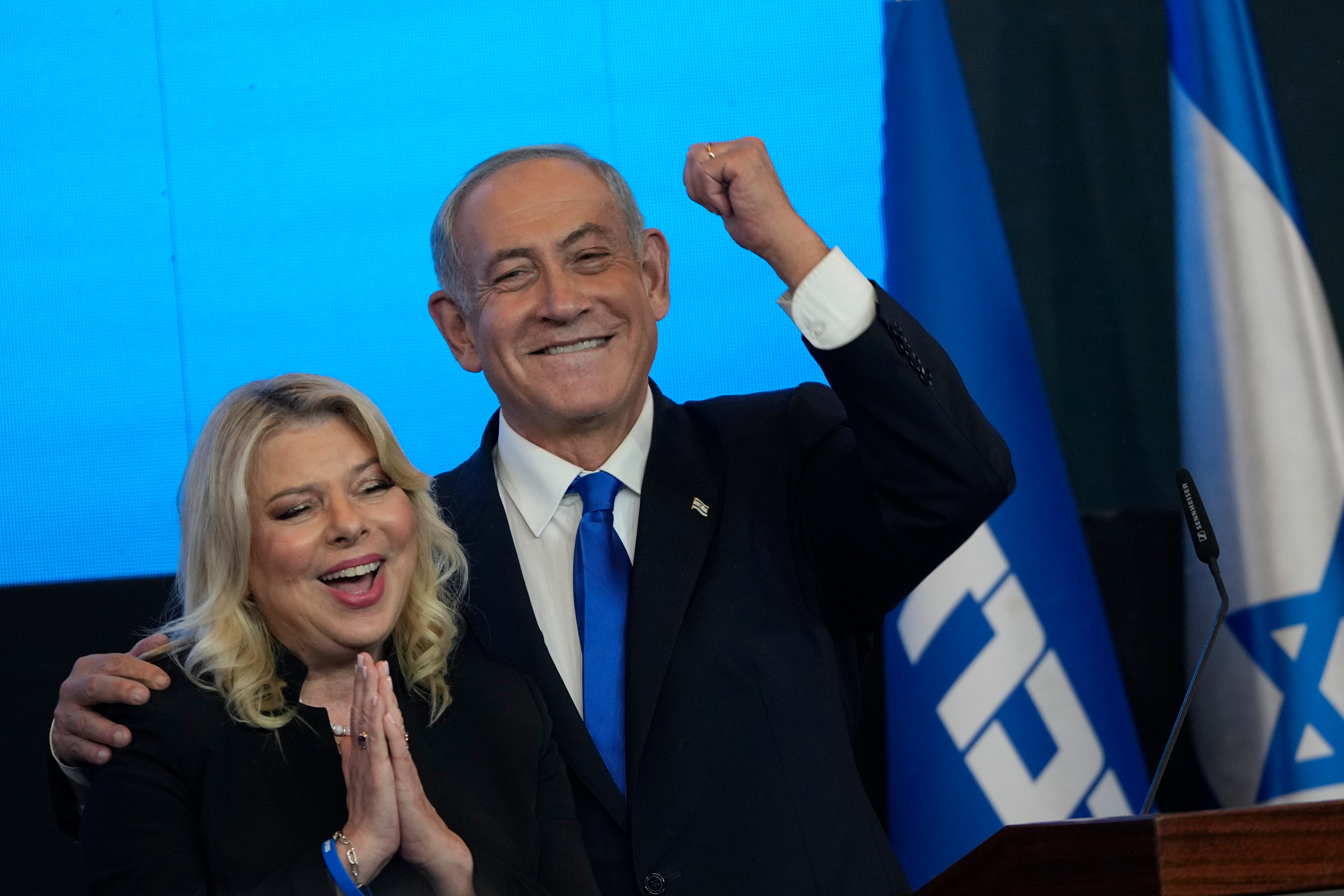Benjamin Netanyahu: Israel’s former prime minister is in the middle of another comeback
Having faced years of political chaos triggered by an ongoing corruption trial, ‘Bibi’ is set to extend his record as the country’s longest-serving prime minister, write David Harding and Chris Stevenson


After losing the 2021 Israeli general election, Benjamin “Bibi” Netanyahu had a message for all those revelling in his political demise.
“We’ll be back!” he said defiantly, as he relinquished Israel’s premiership in June last year after 12 years as the country’s leader. It sounded like both a promise and a threat.
Whatever it was, it has taken him just 17 months to be proved right. After last Tuesday’s election, Netanyahu is truly back.
His Likud party is the biggest single political force in the country. Together with right-wing allies, some of them on the far right, Netanyahu has enough seats to secure a majority in the Knesset (Israel’s parliament) and once again become the country’s prime minister, a job he first secured in 1996.
Then, he was Israel’s youngest-ever prime minister. Born in 1949, he was also the first prime minister of Israel to have been born after the state was formed a year earlier. In the next few days, the now 73-year-old will once again be crowned the country’s leader.
It will be his third stint as Israeli PM, having also held the post between 2009 and June 2021, a 12-year stretch that also helped Netanyahu to make history as the country’s longest-standing leader. That distinction is now set to be extended, as is his domination of Israeli politics. Netanyahu has won a record five elections to hold office six times – more than any other prime minister in Israel’s 74-year history.
Previously it has been claimed that Netanyahu led the most right-wing government in Israeli history in his second period in office. The administration he is about to head is almost certain to claim that dubious honour for itself. Netanyahu has built his political career on an image of being a strongman. That has meant taking an extremely hard line in dealings with the Palestinians, putting what he sees as Israel’s security concerns above any potential concessions in peace talks. Netanyahu has also often talked up the existential threat he believes Iran poses to Israel.
His re-election will have ramifications beyond Israel and on the global stage also. In his last stint as PM, he was close to Donald Trump, who may spring a political comeback of his own in 2024. How he gets on with Joe Biden in the meantime will be closely watched, as will his relationship with Russia’s Vladimir Putin.
The two seemingly like-minded characters previously enjoyed a good relationship, but that could be tested now by the war in Ukraine. Russia is being supplied with armed drones by Iran. And discussions over Tehran’s nuclear deal are likely to concentrate the minds of the new administration in Israel, as are the country’s changing relations with countries in the Gulf.
And, in the background, Netanyahu still faces potentially career-ending corruption charges, which led to a trial that began in March 2020 and has still not concluded. Netanyahu denies all the charges against him.
This latest comeback does show one thing: that whatever people think of Netanyahu – his opponents consider him a danger to Israel’s democracy – he is a political survivor.
Born in Tel Aviv, in 1963 his family moved to the US, where his father had been offered an academic post. At the age of 18, Netanyahu returned to Israel, where he spent five years in the army, serving as a captain in an elite commando unit, the Sayeret Matkal, including fighting in the 1973 Middle East war.
The second of three brothers, it was Netanyahu’s elder brother Yonatan who was seen as a potential leader of Israel. But he died in a military raid on Entebbe, Uganda, in 1976, in an operation to rescue hostages from a hijacked airliner. Netanyahu would set up an anti-terrorism institute in his brother’s memory before becoming Israel’s deputy chief of mission in Washington in 1982. He became a regular face on US TV – something that would continue into the 1990s, particulrly during the Gulf war. He was appointed Israel’s permanent representative at the UN in New York in 1984.
Returning to Israel in 1988, his political career kicked off in earnest. He won a seat in the Knesset for the Likud party, and was made a deputy of the foreign minister Moshe Arens, and later on of David Levy. He won a leadership election for Likud in 1993, which was instigated in the wake of the electoral defeat of the party in 1992, and became party chair. Following the assassination of prime minister Yitzhak Rabin in 1995, an early election was called in 1996, for which Netanyahu ran a campaign depicting himself as the man to bring “a secure peace” with the Palestinians.
After winning office, Netanyahu continued to implement the 1993 Oslo Accords between Israel and the Palestinians, although he was fiercely critical of them and there was a noticeable slowdown in the peace process. In his first speech to the US Congress on 10 July 1996, Netanyahu made clear that the use of strength, rather than compromise, would be his guilding framework. “In our Hebrew scriptures, which spread from Jerusalem to all of mankind, there is a verse: ‘God will give strength to his people; God will bless his people with peace,’” he said. “This is the original, inspired source for the truth that peace derives from strength.”
However, Netanyahu signed a deal handing over 80 per cent of Hebron to Palestinian Authority control, and agreed to further withdrawals from the occupied West Bank, much to the chagrin of the political right. Netanyahu lost office in 1999, having called an election 17 months early.
Netanyahu then stepped down as Likud leader, and was replaced by Ariel Sharon. He returned to government after Sharon became prime minister in 2001, first as foreign minister and then as finance minister. In 2005, he resigned in protest at the Israeli withdrawal from the occupied Gaza Strip.
Sharon split from the party later that year, giving Netanyahu another chance at the leadership of Likud. Netanyahu returned to the role of prime minister following elections in 2009. Under political pressure from the administration of Barack Obama, who wanted Israel and the Palestinians to resume peace talks, Netanyahu agreed to an unprecedented 10-month freeze on settlement construction in the West Bank, but negotiations between the two sides collapsed in late 2010.
During his time in office between 2009 and 2021, there were three major conflicts in and around Gaza – in 2012, 2014 and 2021 – between Israel and Palestinian militants. The war in 2014, over 50 days, killed 2,251 Palestinians, more than half of them civilians according to UN figures, and 74 Israelis, including six civilians.
Relations between Netanyahu and Obama were always seen as difficult. Donald Trump entering the White House in January 2017 changed the dynamic. Within a year, Trump announced his recognition of Jerusalem as Israel’s capital, a highly controversial move, with the Arab world supporting the Palestinians’ claim to the eastern half of Jerusalem, which had been occupied by Israel since the 1967 Middle East war.
The corruption scandal that has dogged Netanyahu since 2016 overshadowed his recent years in power, and pushed him to seek the support of those on the far right of the political spectrum. Netanyahu appears to see himself as the victim of a politically motivated “witch hunt”. We will have to see what effect this has on his latest attempt to form a government and sit atop Israel’s politics once again.






Join our commenting forum
Join thought-provoking conversations, follow other Independent readers and see their replies
Comments